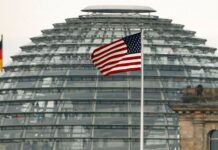Roberta Metsola, support for Ukraine and Ursula von der Leyen will be the main topics of the first plenary session since the June elections.
The European Parliament is back in session with the newly-elected 720 lawmakers gathering in Strasbourg for the first plenary of the 10th legislature, set to begin on Tuesday.
It marks the dawn of a five-year mandate that is poised to be the rowdiest in history: following the June elections, over a quarter of MEPs now sit with hard- and far-right groups, posing a direct challenge to the pro-European centrist parties that, despite holding onto a governing majority, worry an increase in polarisation could dampen the bloc’s long-term ambitions and foster legislative paralysis.
The latest addition to the radical right is the so-called Europe of Sovereign Nations (ESN), a 24-strong group that encompasses forces ardently anti-migration, anti-LGBT, anti-feminism, anti-Green Deal, anti-vaccination and anti-military aid to Ukraine.
Its creation came on the heels of that of Patriots for Europe, with the likes of France’s National Rally, Hungary’s Fidesz, Italy’s Lega and Austria’s Freedom Party (FPÖ). The formation has amassed 84 MEPs, enough to become the third largest in the hemicycle.
The shifting landscape will test the limits of the cordon sanitaire that mainstream parties have until now placed on the far right, depriving it of high-profile positions in the institutions, such as vice-presidents and committee chairs.
Before the Parliament descends into full-blown, finger-pointing brawls, here’s an overview of the agenda for the first plenary session.
Tuesday: Metsola’s done deal
MEPs will kick off their work by electing their president for the next two years and a half. The frontrunner is a familiar face: Roberta Metsola, the Maltese politician who has led the institution since early 2022.
Hailing from the centre-right European People’s Party (EPP), Metsola is a moderate figure who is well-liked across the political spectrum and is considered to have done a good job representing the Parliament’s views. Thanks to her track record, her re-election by an absolute majority (50% of MEPs plus one) is a foregone conclusion.
The Left is reportedly interested in filing an alternative candidate, as they did last time in 2022. However, the alternative bid will be entirely symbolic.
The vote will be followed by the election of the 14 vice-presidents, proportionally distributed among the main parties. This will assess the effectiveness of the cordon sanitaire: Patriots for Europe is vying to secure one of the vice-presidents, something that the EPP, the Socialists and the Liberals have vowed to prevent.
“These are elected posts of the Parliament,” an EPP spokesperson said on Friday. “We don’t want these MEPs to represent the institution, that’s the main reason.”
Wednesday: backing Ukraine, rebuking Orbán
The emergence of new far-right groups has raised fears the Parliament’s iron-clad support for Ukraine in the face of Russia’s aggression will be progressively weakened over the next five years.
To dispel any doubts, MEPs are expected to devote the first resolution under the 10th legislature to double down on their backing for the war-torn nation, urging member states to step up military assistance and make progress in the accession process.
The joint call can be read as a rebuke to Viktor Orbán’s extremely controversial visits to Russia and China as part of his self-proclaimed “peace mission,” which EU leaders harshly denounced. Although Budapest insists the trips took place in the context of bilateral relations, the fact they coincided with the start of Hungary’s six-month presidency of the EU Council prompted accusations of power exploitation.
Charles Michel, the president of the European Council, was initially expected to attend the plenary session and debate Orbán’s tour with MEPs. But the item was eventually taken off the agenda and Michel will not show up in Strasbourg.
Wednesday will also see a vote on how many lawmakers sit in each of the Parliament’s standing committees, subcommittees and delegations. The MEPs chairing these bodies will be decided at a later stage – another test for the cordon sanitaire.
Thursday: von der Leyen faces the music
Here’s the grab-your-popcorn moment of the week: MEPs will vote on whether to elect Ursula von der Leyen as president of the European Commission for a second term.
EU leaders hand-picked the incumbent as part of a three-pronged deal on the top jobs. But the Parliament is set to flex its muscles as the bloc’s only directly elected institution and make von der Leyen sweat.
The Socialists and the Liberals have all come up with detailed wishlists that they want the Commission chief to include in her work programme in exchange for their endorsements. Von der Leyen’s own family, the EPP, is not fully behind her re-election, meaning she needs as many votes as possible from other mainstream parties.
The Greens, which, strictly speaking, are not part of the president’s centrist platform, are shaping up to be the day’s kingmakers. Its 53 MEPs have no shortage of complaints about von der Leyen’s stewardship (for instance, on the rule of law and migration) but they acknowledge her policy accomplishments under the Green Deal.
The result of these give-and-take negotiations will crystalise in the big speech that von der Leyen will deliver on Thursday at 09:00 CET, outlining the main priorities and initiatives she intends to undertake during her (potential) second mandate.
Making matters more dramatic, the day before the crunch vote, the European Court of Justice will issue a much-anticipated ruling over access to information related to von der Leyen’s handling of vaccine contracts, particularly her texts with the Pfizer CEO.
If the nominee fails to secure the necessary 361 votes, EU leaders will have one month to propose a new name. The last-minute hiccup could force the re-opening of the entire deal on top jobs, which also covers António Costa and Kaja Kallas.














